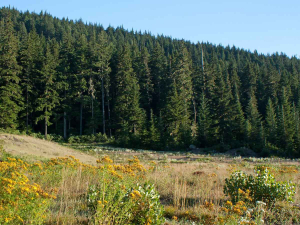Tickets available for Beef + Lamb NZ's Out the Gate 2026
Tickets are now available for Beef + Lamb New Zealand’s (B+LNZ) Out the Gate, returning from 19-21 May 2026 at Te Pae, Christchurch.
 According to the report, a further 38,921ha of sheep and beef farms have been sold for conversion to forestry since September 2024.
According to the report, a further 38,921ha of sheep and beef farms have been sold for conversion to forestry since September 2024.
Red meat farmers are urging the Government to act on the growing number of whole sheep and beef farm sales for conversion to forestry, particularly carbon farming.
Beef + Lamb New Zealand released updated independent research by Orme & Associates showing a further 38,921ha has been confirmed as sold since the last report in September 2024.
Revised confirmed sales in 2023 now total 29,518 hectares and in 2024 now 30,483 hectares - that figure is expected to rise as further sales are confirmed.
Sales through Overseas Investment Office approvals and to carbon-only forestry entities continue to dominate.
The total amount of whole sheep and beef farms sold since 1 January 2017 is now over 300,000ha.
B+LNZ chair Kate Acland says the figures reinforce the need for action.
"While we appreciate the Government's announcement this week about legislation being introduced to restrict wholesale conversions based on land use classes, the numbers show whole-farm sales for conversion to forestry for carbon credits are continuing at pace.
"Anecdotally we're still hearing of a significant number of farms being sold this year, despite the Government announcing the limits last year.
"We're concerned that some sales are continuing on the basis of intent to purchase land before the limits were announced. We urgently need the Government to tighten the criteria around proof of intent to purchase."
Global trade has been thrown into another bout of uncertainty following the overnight ruling by US Supreme Court, striking down President Donald Trump's decision to impose additional tariffs on trading partners.
Controls on the movement of fruit and vegetables in the Auckland suburb of Mt Roskill have been lifted.
Fonterra farmer shareholders and unit holders are in line for another payment in April.
Farmers are being encouraged to take a closer look at the refrigerants running inside their on-farm systems, as international and domestic pressure continues to build on high global warming potential (GWP) 400-series refrigerants.
As expected, Fonterra has lifted its 2025-26 forecast farmgate milk price mid-point to $9.50/kgMS.
Bovonic says a return on investment study has found its automated mastitis detection technology, QuadSense, is delivering financial, labour, and animal-health benefits on New Zealand dairy farms worth an estimated $29,547 per season.

OPINION: Here w go: the election date is set for November 7 and the politicians are out of the gate…
OPINION: ECan data was released a few days ago showing Canterbury farmers have made “giant strides on environmental performance”.